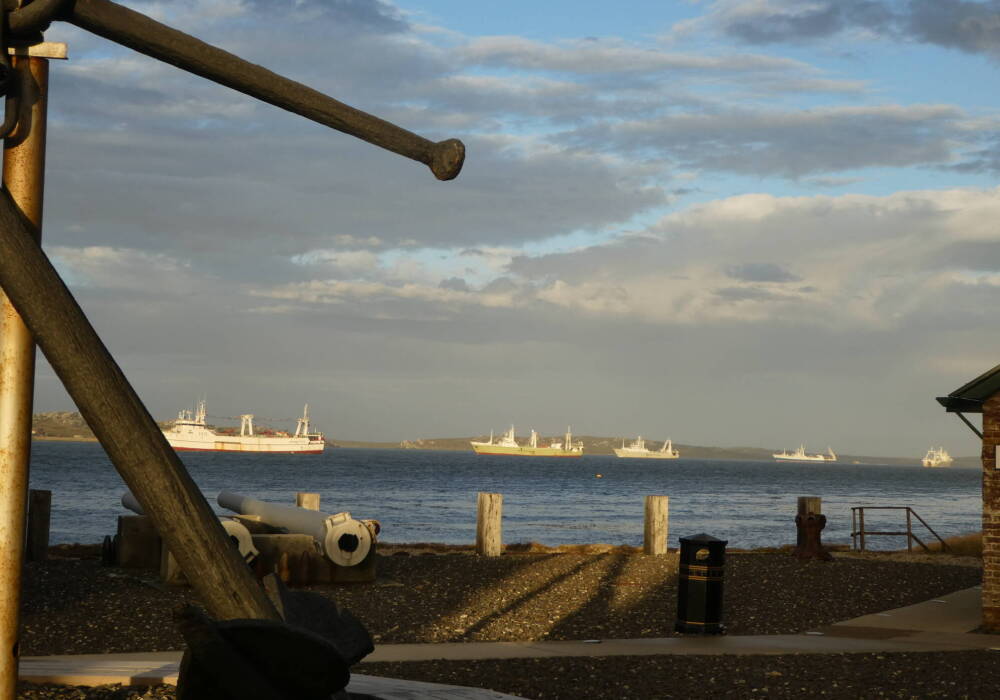News
BACK TO NEWS LIST
Frustration and Dismay at 2024 ITQ fee raid

FIFCA subjected to large increases once again
Frustration and dismay over Exco ITQ fees decision for 2024.
FIFCA note with dismay and real concern the announcement regarding ITQ fees for 2024. Such unprecedented increases over recent years are unsustainable over the longer term. The imposition of 22% and 33% increases on top of what is already one of the highest fees in the world are wholly unjustifiable, especially when the current system that was designed to ensure that the government receives 26% in corporation tax of any increased profit without putting up fees. This has worked well for the benefit of all over the years . Until now, the impact of FIGs rash and irresponsible decision making has been masked by unusually favourable economic conditions in the loligo and toothfish fisheries. History tells us that such conditions cannot continue forever. The early closure of the second season on conservation grounds last year is a stark reminder of the volatility of the Loligo stock. This coupled with oceanic change would indicate we may have reached the end of the current boom cycle and the state of the stocks will only be known at the end of February next year which is the start of the new season.
This message has been clearly communicated to FIG on numerous occasions but has always fallen on deaf ears, as they continue with their avaricious approach to the industry, showing that it is a government that is increasingly out of touch with large parts of the business community and fundamental economic realities. This observation stood out in the recent Business Climate Survey, so is not restricted to just our sector.
That such increases have been imposed directly prior to a supposed consultative process with industry around future long-term fee setting mechanisms only serves to make an absolute mockery of the spirit of text of the joint FIFCA/FIG Accord that was signed in 2021. What little faith existed around MLAs wishing to have a reasoned and evidenced discussion next year has now all but disappeared
It is worth remembering that MLAs have again imposed such a tax increase at a time when FIG is running another annual budget surplus, at over £40m for this financial year, contributing to surpluses totalling £157m over the last 6 years alone This begs the question as to why MLAs believe even more money is best held in reserve to be invested overseas by government, rather than invested locally by companies who have a demonstrable history of doing so.
FIFCA members invested over £100m between 2019 and 2022. A further £100m will be spent on vessel replacement during 2023 and 2024, with a further £200m+ required over the coming years. This investment is now unavoidable if the fishery is to continue to support the Islands over the longer term. With the funds that should have remained in the industry for vessel replacement having been diverted to fund the Falkland Islands Government, the industry requires to borrow large sums. Vessel new builds that ordinarily would have been constructed pre-Covid are now 30-35% more expensive, access to foreign finance plays a critical role in these levels of investment and funding will only be secured if it can be demonstrated that fishing companies are operating within a fiscally stable regime. There is real concern that FIG’s approach to the sector will send the wrong message to those lending institutions. This increased risk materialises as increased interest rates, further reducing the return to FIG in future years. The recent offer by the Falkland Island Government to provide a “letter of comfort” to such lending institutions was never going to count for anything at all as lenders in Spain have become increasingly wary about who they lend such large amounts of capital to. For any such offer to have been seriously considered, a stable fiscal regime must already first be in place.
The 2019 50% increase or, “rebasing” of the fees that equated to £20m saw in excess of £15m of that squandered on a port project that has left us all and FIPASS worse off now than we were 4 years ago. Regrettably, it seems as though FIG’s answer and approach to bringing its own poor spending record back under control is to directly impose wholly unreasonable increases on to the fishing industry, a sector that for far too long has been seen as an easy target. Whilst this philosophy continues, these investments are likely to be thoroughly reviewed.
Recent News
-
14/Oct/2025
Falklands Representation at Conxemar 2025
FIFCA representatives were proud to attend Conxemar 2025 on behalf of the...
-
01/Jul/2025
Historic home for FIFCA
The Falkland Islands Fishing Companies Association (FIFCA) has a new home in the...
-
11/Jun/2025
FIFCA success at the 2025 Barcelona Seafood Expo
The Barcelona Seafood Expo Global (SEG) is the world’s largest seafood...
-
11/Jun/2025
Falklands marks World Ocean Day 2025
The Falkland Islands Fishing Companies Association (FIFCA) was represented at a...
-
08/Dec/2024
Continued investment, despite challenging environment.
The early closure of, and non-opening of the second Loligo fishing seasons in...
